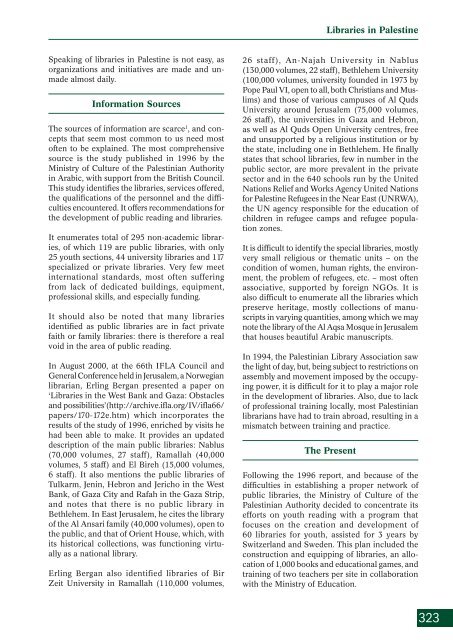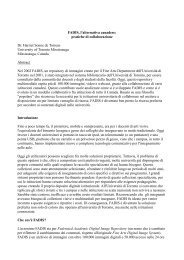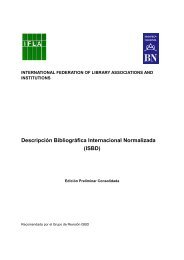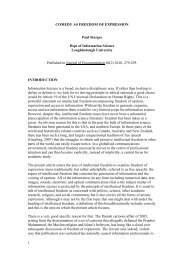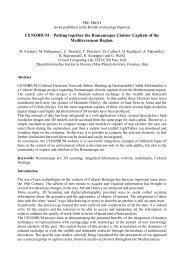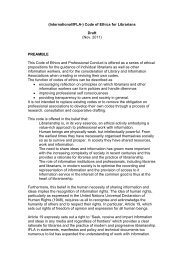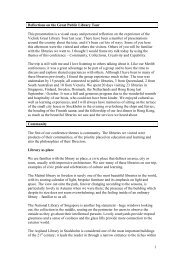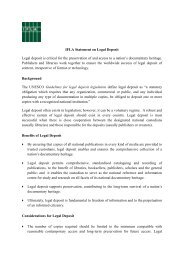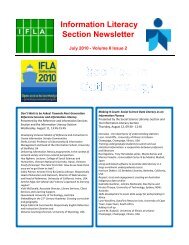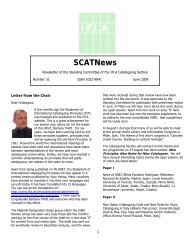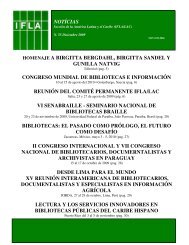World Library and Information Congress, Milan, 2009 - IFLA
World Library and Information Congress, Milan, 2009 - IFLA
World Library and Information Congress, Milan, 2009 - IFLA
Create successful ePaper yourself
Turn your PDF publications into a flip-book with our unique Google optimized e-Paper software.
Speaking of libraries in Palestine is not easy, as<br />
organizations <strong>and</strong> initiatives are made <strong>and</strong> unmade<br />
almost daily.<br />
<strong>Information</strong> Sources<br />
The sources of information are scarce 1 , <strong>and</strong> concepts<br />
that seem most common to us need most<br />
often to be explained. The most comprehensive<br />
source is the study published in 1996 by the<br />
Ministry of Culture of the Palestinian Authority<br />
in Arabic, with support from the British Council.<br />
This study identifi es the libraries, services offered,<br />
the qualifi cations of the personnel <strong>and</strong> the diffi -<br />
culties encountered. It offers recommendations for<br />
the development of public reading <strong>and</strong> libraries.<br />
It enumerates total of 295 non-academic libraries,<br />
of which 119 are public libraries, with only<br />
25 youth sections, 44 university libraries <strong>and</strong> 117<br />
specialized or private libraries. Very few meet<br />
international st<strong>and</strong>ards, most often suffering<br />
from lack of dedicated buildings, equipment,<br />
professional skills, <strong>and</strong> especially funding.<br />
It should also be noted that many libraries<br />
identifi ed as public libraries are in fact private<br />
faith or family libraries: there is therefore a real<br />
void in the area of public reading.<br />
In August 2000, at the 66th <strong>IFLA</strong> Council <strong>and</strong><br />
General Conference held in Jerusalem, a Norwegian<br />
librarian, Erling Bergan presented a paper on<br />
‘Libraries in the West Bank <strong>and</strong> Gaza: Obstacles<br />
<strong>and</strong> possibilities’(http://archive.ifl a.org/IV/ifl a66/<br />
papers/170-172e.htm) which incorporates the<br />
results of the study of 1996, enriched by visits he<br />
had been able to make. It provides an updated<br />
description of the main public libraries: Nablus<br />
(70,000 volumes, 27 staff), Ramallah (40,000<br />
volumes, 5 staff) <strong>and</strong> El Bireh (15,000 volumes,<br />
6 staff). It also mentions the public libraries of<br />
Tulkarm, Jenin, Hebron <strong>and</strong> Jericho in the West<br />
Bank, of Gaza City <strong>and</strong> Rafah in the Gaza Strip,<br />
<strong>and</strong> notes that there is no public library in<br />
Bethlehem. In East Jerusalem, he cites the library<br />
of the Al Ansari family (40,000 volumes), open to<br />
the public, <strong>and</strong> that of Orient House, which, with<br />
its historical collections, was functioning virtually<br />
as a national library.<br />
Erling Bergan also identified libraries of Bir<br />
Zeit University in Ramallah (110,000 volumes,<br />
Libraries in Palestine<br />
26 staff), An-Najah University in Nablus<br />
(130,000 volumes, 22 staff), Bethlehem University<br />
(100,000 volumes, university founded in 1973 by<br />
Pope Paul VI, open to all, both Christians <strong>and</strong> Muslims)<br />
<strong>and</strong> those of various campuses of Al Quds<br />
University around Jerusalem (75,000 volumes,<br />
26 staff), the universities in Gaza <strong>and</strong> Hebron,<br />
as well as Al Quds Open University centres, free<br />
<strong>and</strong> unsupported by a religious institution or by<br />
the state, including one in Bethlehem. He fi nally<br />
states that school libraries, few in number in the<br />
public sector, are more prevalent in the private<br />
sector <strong>and</strong> in the 640 schools run by the United<br />
Nations Relief <strong>and</strong> Works Agency United Nations<br />
for Palestine Refugees in the Near East (UNRWA),<br />
the UN agency responsible for the education of<br />
children in refugee camps <strong>and</strong> refugee population<br />
zones.<br />
It is diffi cult to identify the special libraries, mostly<br />
very small religious or thematic units – on the<br />
condition of women, human rights, the environment,<br />
the problem of refugees, etc. – most often<br />
associative, supported by foreign NGOs. It is<br />
also diffi cult to enumerate all the libraries which<br />
preserve heritage, mostly collections of manuscripts<br />
in varying quantities, among which we may<br />
note the library of the Al Aqsa Mosque in Jerusalem<br />
that houses beautiful Arabic manuscripts.<br />
In 1994, the Palestinian <strong>Library</strong> Association saw<br />
the light of day, but, being subject to restrictions on<br />
assembly <strong>and</strong> movement imposed by the occupying<br />
power, it is diffi cult for it to play a major role<br />
in the development of libraries. Also, due to lack<br />
of professional training locally, most Palestinian<br />
librarians have had to train abroad, resulting in a<br />
mismatch between training <strong>and</strong> practice.<br />
The Present<br />
Following the 1996 report, <strong>and</strong> because of the<br />
diffi culties in establishing a proper network of<br />
public libraries, the Ministry of Culture of the<br />
Palestinian Authority decided to concentrate its<br />
efforts on youth reading with a program that<br />
focuses on the creation <strong>and</strong> development of<br />
60 libraries for youth, assisted for 3 years by<br />
Switzerl<strong>and</strong> <strong>and</strong> Sweden. This plan included the<br />
construction <strong>and</strong> equipping of libraries, an allocation<br />
of 1,000 books <strong>and</strong> educational games, <strong>and</strong><br />
training of two teachers per site in collaboration<br />
with the Ministry of Education.<br />
323


